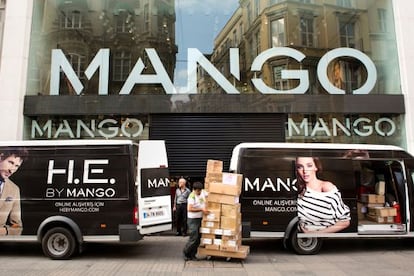Mango’s metamorphosis
Fashion retailer has designs on tripling its turnover over the next five years with new chain-store brands

“We realized that the girls at our offices no longer wore Mango clothes, because they couldn’t always find the things they wanted to wear for work. So we decided to turn that around. And it’s working,” says Enric Casi, director general of Mango, summing up one of the strategic changes the company made in 2011.
“Before this, nearly 70 percent of the items available in stores were meant for special occasions, such as parties or events. Only the other 30 percent was for everyday use,” he adds. “Now, most of the collection is made up of garments that are more wearable on an everyday basis.”
This is just one example of Mango’s turnaround. But whatever the reason, it seems to be working: sales grew 20 percent in 2012, and profits soared by nearly 80 percent. And the metamorphosis has just begun: the company wants to triple its business in just five years.
The thing is, Mango no longer wants to play in the second division in a textile world where Zara is king. It wants to get into the big leagues, and go from 2012 turnover figures of over 1.6 billion euros to 4.97 billion in 2017. But how will it make that kind of leap? The company says it will do it through new lines of business — i.e. launching chain stores under different brands to reach a wider audience — and continuing with its international expansion.
We want to grow the company fivefold¨
But is there a secret weapon? According to Casi, it’s not just the type of garment on sale that has changed at Mango, it’s also the price strategy. There are no longer so many items on sale, and not nearly so many price tag changes. Instead, products hit the shelves at the cheapest price possible, and stay there.
The interior decoration at stores has been altered as well: rather than minimalist displays, the shelves are fuller and there are several sizes of any one item available on racks. “There is more self-service, which is what customers wanted,” says Casi.
Founded in Barcelona in 1984, Mango is present in 109 countries and boasts 2,598 sales points. Franchises play a vital role in international expansion, especially in countries such as Saudi Arabia or the US. In fact, 52.2 percent of sales space corresponds to franchises.
Mango no longer wants to play in the second division in a textile world where Zara is king¨
All this has enabled Mango to post a turnover of 1.69 billion euros in 2012. This makes the 100-percent Spanish-owned company a heavyweight in its own country, perhaps even in Europe — but certainly not in the world. Inditex, owner of Zara, saw turnover of 15.94 billion euros last year, while GAP’s was around 11.75 billion euros. But Mango execs are optimistic. “We want to grow the company fivefold in the coming years,” company president Isak Andic writes in the 2012 corporate report.
And yes, there is a secret weapon: becoming a group, rather than a company. If Inditex has Zara, Bershka and Massimo Dutti, Mango will have Violeta and Rebels, scheduled for launch in 2014.
The first brand will specialize in larger sizes, while the second one is aimed at the 14-to-20 age segment.
But growth will have a price. How will Mango foot the bill? “With our own resources,” says Casi. Mango’s debt currently stands at 1.08 billion euros, most of it long-term. Yet the company is not considering a public offering.
“Being listed on the stock market can be useful if you are a company with huge financing needs or if you have a very broad family structure with internal power struggles,” says Casi. “But that’s not our case.”
Tu suscripción se está usando en otro dispositivo
¿Quieres añadir otro usuario a tu suscripción?
Si continúas leyendo en este dispositivo, no se podrá leer en el otro.
FlechaTu suscripción se está usando en otro dispositivo y solo puedes acceder a EL PAÍS desde un dispositivo a la vez.
Si quieres compartir tu cuenta, cambia tu suscripción a la modalidad Premium, así podrás añadir otro usuario. Cada uno accederá con su propia cuenta de email, lo que os permitirá personalizar vuestra experiencia en EL PAÍS.
¿Tienes una suscripción de empresa? Accede aquí para contratar más cuentas.
En el caso de no saber quién está usando tu cuenta, te recomendamos cambiar tu contraseña aquí.
Si decides continuar compartiendo tu cuenta, este mensaje se mostrará en tu dispositivo y en el de la otra persona que está usando tu cuenta de forma indefinida, afectando a tu experiencia de lectura. Puedes consultar aquí los términos y condiciones de la suscripción digital.









































